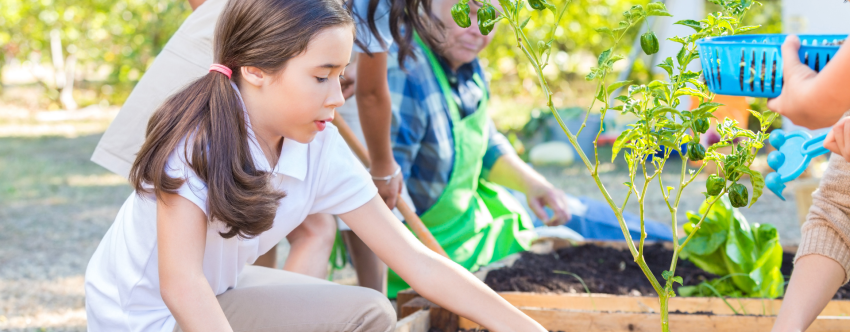News & Views

The importance of getting children outside
Over the last 50 years, young people’s time outdoors has steadily decreased. When the government limited our time outdoors due to COVID-19, we developed a new appreciation of natural spaces and the outdoors acquired a new significance. Is it time to re-evaluate our relationship with learning and the outdoors?
Physical benefits
We know that pupils need to be less sedentary: obesity continues to be a UK-wide issue, affecting one in five Year 6 students. As well as impacting physical wellbeing, obesity can also lead to feelings of shame and low confidence. The NHS recommends that under-18s need at least 60 minutes of physical activity every day. Outdoor learning tends to be less passive than indoor learning.
Outdoor learning should be more than simply taking the chairs and tables into the playground, and studies show that children and young people are significantly more engaged by physical movement outdoors.
Green benefits
If you’re feeling overwhelmed and you think of a place that brings calm, it’s likely to be a green space. It’s no coincidence that many nurture rooms feature images of nature: we all benefit emotionally and physically from natural spaces. Time spent in nature can even be preventative and research shows that increased tree cover is linked to a reduction in asthma rates in young children. For children with ADHD, spending 20 minutes in a green space can be as effective as taking a dose of Ritalin.
“How many schools have there been with a chain-link and black-top playground where there has been a spontaneous revolution by students to dig it up and produce a human environment instead of a prison?”
(Simon Nicholson, 1971)
Children and young people are under increasing pressure, and one out of six are likely to have problems with their mental health. Natural spaces have been shown to benefit our mental health even if there is just a solitary tree, but the wilder the space, the better we are likely to feel. A study by the Wildlife Trust found that 84 per cent of children who took part in regular outdoor activities felt more capable of tackling new endeavours. These rich, meaningful learning experiences outdoors (alongside strong relationships) help students to build resilience. Resilient young people tend to be more competent and also positive about themselves and life in general.
In the 1980s, biologist Edward O. Wilson suggested that we are drawn to nature because, historically, it helped us to survive, and ‘nature connectedness’ has been shown to lower levels of depression and anxiety. Attention Restoration Theory (ART) proposes that interactions with a natural environment allow our attention to rest. This means that time outdoors restores students’ focus and concentration, and studies have shown that increased time outdoors can lead to better performance on summative tests and exams. Researchers have found that young people have lower levels of cortisol after time outdoors, leading to reduced levels of stress and fatigue.
Care for what nurtures you
Just as nature cares for us, we are more likely to care for the natural world if we feel more connected to it. We can’t escape the fact that climate change is happening, and this can be a source of acute anxiety for children and young people. Young people will need to find solutions to unique issues in the future.
A study by the University of Plymouth has established that regular time in nature encourages individuals to act in ways that protect the health of the planet. For example, people recycled more and became concerned about conservation. Building an emotional connection with the outdoors leads to health benefits but also inspires people to tackle climate change.
Placeness
Placeness is an old word that means to have or occupy a space. This word has become more significant recently as children and young people appear to have less ownership of outdoor spaces. Outdoor learning gives children and young people the opportunity to see outdoor spaces from a different perspective and to increase their sense of belonging – a crucial part of wellbeing. A lack of connection to the spaces around us can mean poor mental health outcomes.
Studies show that, globally, children and young people increasingly feel their views are not listened to. Learning outdoors can establish a flattened hierarchy where students and teachers become partners in learning. Children and young people tend to know their outdoor space in a way that adults do not and can offer crucial insights, becoming the ‘experts'.
Meaningful, authentic learning
“Children are more likely to remember what they learned outside because it was concrete and personally meaningful.”
(Jeanne E. Ormrod)
Outdoor learning is often more relevant and meaningful to students. Problem-solving becomes more tangible and there is more scope for testing and making mistakes. Students are more hands-on and this leads to increased responsibility and ownership for learning. Taking the learning outdoors offers a different context for the learning (and the assessment). Students are prompted to explore, discuss and analyse in a setting where they can raise their voices, make big movements and express themselves in a variety of ways.
Emotional regulation
Of course, there can be behaviour issues with moving the learning outside and you need to establish ground rules. However, the outdoor space is an ideal training ground for conflict resolution. Conflict is a natural and normal part of everyday life and outdoors, children and young people can more easily learn the skills to deal with challenging emotional situations. Key to this is the sensitive support of adults who don’t step in prematurely.
Outdoor learning can give students the experience of big emotions such as frustration and this is productive. Having the opportunity to identify one’s own feelings and build skills such as empathy, problem-solving and turn-taking can be the root of lifelong wellbeing.
Here, we have the foundation of friendships. Tackling outdoor challenges, working as a team and even competing, are effective ways to establish and maintain relationships.
Click here to find out more about the Outdoor Learning Award and how it can help pupils grow in confidence and skills...
About the author

Sarah Watkins is a former headteacher and current Associate Lecturer at Worcester University. She is also a Forest School leader and has written a book called Outdoor Play for Healthy Little Minds.